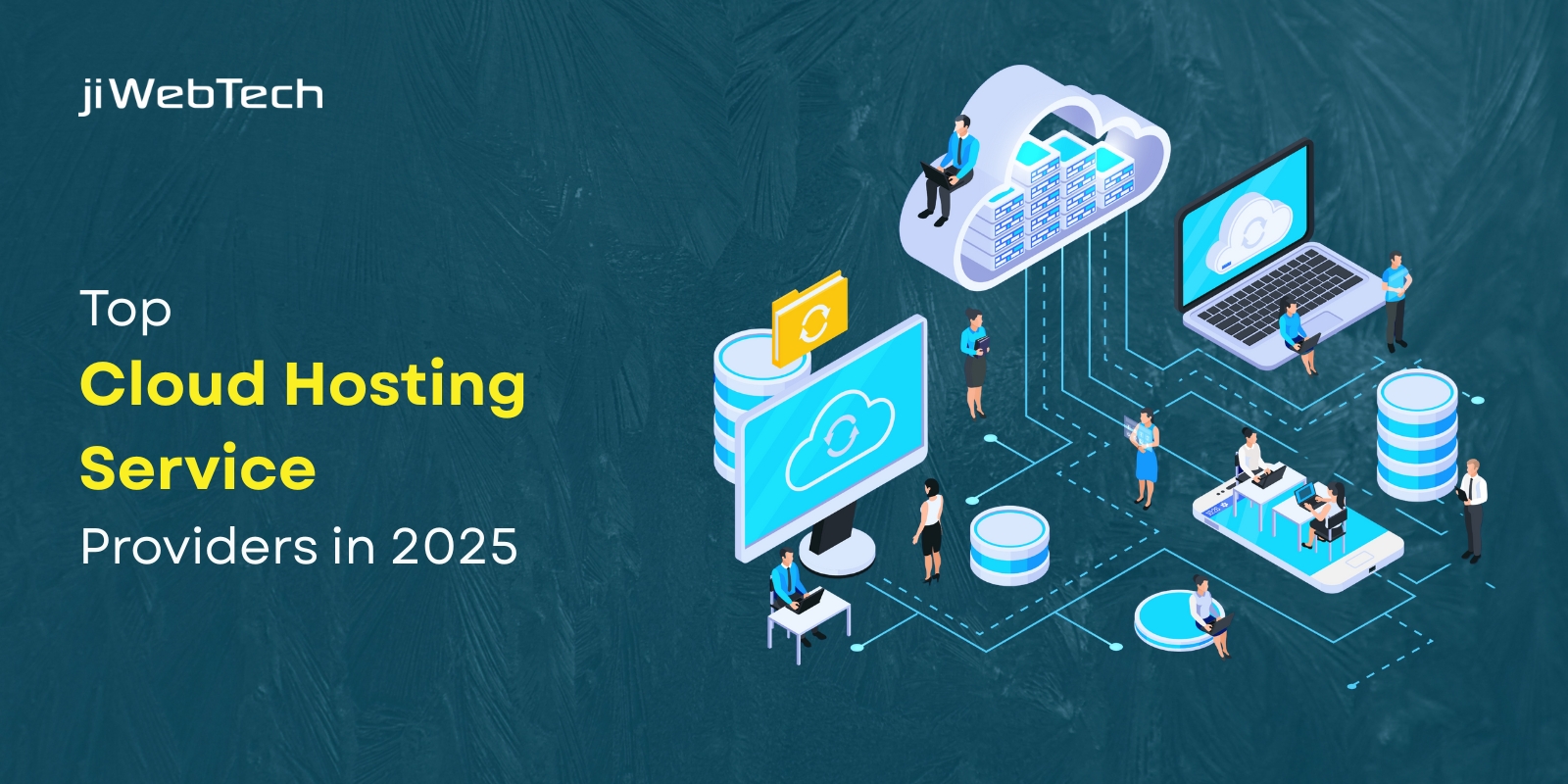- Jul 02, 2025
- Cloud Hosting
- 2355
Share this post on:

Did you know 94% of businesses have noticed improvements in their security after moving to the cloud? 96% of companies use the public cloud, and 84% of companies use the private cloud. The cloud computing market is expected to reach $947.3 billion by 2025.
As cloud computing continues to transform, innovate, and scale businesses, selecting the right cloud service provider becomes crucial. Hiring the right cloud service provider can help you simplify and protect your business.
Why Hire a Cloud Service Provider? Benefits in Detail
Engaging a cloud service providers offer numerous advantages. Here are a few benefits:
- Simplicity and Flexibility: Cloud providers offer a unified package of cloud products and services with pay-as-you-go pricing. This means businesses can scale resources up or down based on demand without paying for unused capacity. This flexibility supports project-based needs and seasonal spikes efficiently.
- Robust Infrastructure and Strong SLAs: Top CSPs maintain state-of-the-art data centers worldwide, offering 24/7 network management, monitoring, and security. They provide strong Service Level Agreements (SLAs) ensuring uptime, performance, and rapid issue resolution aligned with business goals.
- Enhanced Security: Leading cloud providers invest heavily in security protocols, including encryption, access controls, and compliance certifications. Migrating to a reputable CSP ensures sensitive data and applications are protected against unauthorized access and cyber threats.
- Cost Savings and Predictability: Outsourcing cloud management reduces the need for expensive in-house IT staff and infrastructure. CSPs offer predictable monthly billing, helping businesses control and optimize IT spending without surprise costs.
- Centralized Network and Accessibility: Cloud platforms centralize applications and data, enabling remote access for distributed teams. This increases productivity by allowing seamless collaboration and data sharing across locations.
- Disaster Recovery and Business Continuity: CSPs provide robust backup and recovery solutions that minimize downtime during disasters, ransomware attacks, or data loss events. This ensures business operations can quickly resume.
- Expert Support and Compliance: Managed cloud providers bring deep expertise, helping organizations navigate complex cloud environments, meet regulatory requirements, and maintain compliance with industry standards.
- Innovation and Integration: Cloud providers continuously innovate, offering integrated AI, analytics, IoT, and machine learning services. This enables enterprises to build advanced applications and gain competitive advantages.
The List of Top Cloud Service Providers in 2025
Here is a list of the top cloud service providers in 2025:
1. jiWebHosting:
jiWebHosting is a leading cloud service provider focused on delivering tailored cloud solutions primarily for small and medium-sized enterprises (SMEs). jiWebHosting' customized service, cost-effective packages, and local support make it attractive to businesses seeking customized cloud strategies.
Key Features:
Customized cloud architecture and migration services.
Competitive pricing for SMEs.
Strong customer support with a local presence.
Flexibility to integrate with major cloud platforms for hybrid deployments.
Use Cases: SMEs and startups looking for personalized cloud solutions without the complexity of large providers.
2. Amazon Web Services (AWS):
AWS remains the undisputed leader in cloud computing, holding approximately 30-34% of the global market share in 2025. Launched in 2006, AWS offers over 200 fully featured services spanning compute, storage, databases, networking, AI, analytics, and more.
Key Features:
Industry-leading compute services like Amazon EC2.
Scalable storage via Amazon S3.
Broad partner ecosystem and marketplace.
Supports public, private, hybrid, and multi-cloud architectures.
Flexible pricing models, including reserved instances and spot pricing.
Use Cases: Enterprises requiring scalable, reliable, & secure cloud infrastructure, startups needing quick deployment, companies adopting hybrid or multi-cloud strategies.
3. Microsoft Azure:
Microsoft Azure holds about 22-25% of the cloud market, leveraging its deep integration with Microsoft products like Office 365, Windows Server, and Active Directory. Azure excels in hybrid cloud scenarios, offering seamless on-premises to cloud transitions.
Key Features:
Hybrid cloud tools such as Azure Arc and Azure Stack.
Comprehensive PaaS and SaaS offerings.
Strong enterprise security and compliance.
AI and analytics services are integrated with the Microsoft ecosystem.
Use Cases: Enterprises heavily invested in Microsoft technologies, organizations requiring a hybrid cloud, and regulated industries needing compliance.
4. Salesforce Cloud:
Salesforce Cloud is the leading cloud provider in customer relationship management (CRM) and enterprise SaaS applications. It offers cloud-based solutions for sales, marketing, customer service, and analytics.
Key Features:
AI-powered insights with Salesforce Einstein.
Extensive integration capabilities with other cloud platforms.
Industry-specific cloud solutions.
Strong ecosystem with AppExchange marketplace.
Use Cases: Businesses focused on customer engagement, sales automation, and marketing analytics.
5. Alibaba Cloud:
Alibaba Cloud is Asia’s largest cloud provider and a fast-growing global player. It offers a comprehensive suite of cloud services with a focus on AI, big data, and elastic computing.
Key Features:
Strong presence in Asia-Pacific with multiple data centers.
Competitive pricing for high-scale workloads.
Advanced AI and machine learning tools.
Compliance with regional data sovereignty laws.
Use Cases: Enterprises targeting the Asia-Pacific market; businesses requiring scalable AI and big data platforms.
6. SAP Cloud:
SAP Cloud specializes in cloud-based enterprise resource planning (ERP) and business process management solutions. It integrates ERP, analytics, and AI-driven tools into a modular cloud platform.
Key Features:
Cloud ERP suites for finance, supply chain, and HR.
Real-time analytics and business intelligence.
Seamless integration across business functions.
AI-powered decision-making tools.
Use Cases: Large enterprises seeking integrated ERP and business process management in the cloud.
7. VMware Cloud:
VMware Cloud focuses on hybrid cloud solutions, enabling businesses to extend their on-premises VMware environments to the cloud seamlessly.
Key Features:
Virtualization technology with VMware vSphere.
Hybrid cloud management tools.
Network segmentation and security analytics.
Integration with major public cloud providers.
Use Cases: Businesses with existing VMware infrastructure looking for hybrid cloud migration and management.
8. Huawei Cloud:
Huawei Cloud is a rapidly expanding global cloud provider with strong expertise in telecommunications and distributed cloud architectures.
Key Features:
Global data centers with compliance certifications.
AI, IoT, and big data services.
Emphasis on security and reliability.
Solutions tailored for telecom, finance, and public sectors.
Use Cases: Enterprises in telecom and emerging markets; organizations needing secure, distributed cloud infrastructure.
9. DigitalOcean:
DigitalOcean is popular among developers for its simplicity, affordability, and developer-friendly tools. It offers Infrastructure as a Service (IaaS) with straightforward pricing.
Key Features:
Easy-to-use cloud compute instances.
Managed databases and scalable storage.
Strong developer community and documentation.
Transparent pricing with no hidden fees.
Use Cases: Startups, developers, and small businesses needing quick and simple cloud infrastructure.
10. IBM Cloud Platform:
IBM Cloud combines IaaS, PaaS, and SaaS with a strong focus on hybrid and multi-cloud deployments. It integrates AI capabilities from IBM Watson and emphasizes security and compliance.
Key Features:
Hybrid cloud and Kubernetes management.
AI and machine learning services.
Industry-specific solutions for healthcare, finance, and government.
Robust security and compliance certifications.
Use Cases: Enterprises requiring a hybrid cloud with AI integration and strict compliance.
11. Oracle Cloud Infrastructure (OCI):
Oracle Cloud Infrastructure provides high-performance computing, database services, and enterprise applications optimized for Oracle workloads.
Key Features:
Autonomous database services.
High security and automation.
Strong support for ERP and enterprise applications.
Competitive pricing for Oracle-centric enterprises.
Use Cases: Businesses running Oracle databases and applications seeking cloud migration and optimization.
Final Words:
Cloud computing has become the backbone of digital transformation in 2025, and choosing the right cloud service provider is critical for business success. In the blog above, we discussed the top global cloud service provider companies that offer unique strengths to meet the needs of your business.
Hence, hiring a cloud service provider brings flexibility, cost savings, robust security, centralized management, and access to cutting-edge innovation. Whether you are a startup, SMB, or enterprise, leveraging these providers can accelerate growth, improve operational efficiency, and safeguard your business.
If you are looking to hire the best cloud service provider company, jiWeb Technologies is here for you. As we discussed above, being a leading and one of the best cloud hosting service provider company, jiWeb Technologies give businesses the most flexible and secure way to operate and streamline their business. So, what are you waiting for? Contact us today and learn more about our cloud services.









